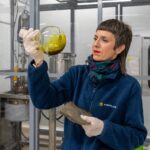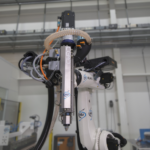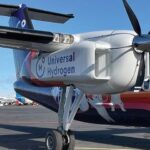AMSilk, the world’s first industrial supplier of synthetic silk biopolymers, today announces a partnership with Airbus, global leader in aeronautics, space and related services. The two companies have entered into a joint cooperation agreement to develop the new era of composites for use in the aerospace industry.
In recent years, the aerospace industry has shifted from metal and steel fuselage and wings to carbon fiber composite materials, primarily in an effort to decrease the plane’s weight and save fuel over time. Airbus, committed to remaining at the forefront of aerospace innovation, is the first in the industry to experiment with this new material. It intends to explore how AMSilk’s Biosteel® fiber can allow them to approach the design and construction of their planes in an entirely new way.
Commercial airlines have, since 2011, been experimenting with using biofuels, which reduce emissions. In recent years, the industry has shifted away from using metal and steel in the main body and wings of airplanes, and toward lighter materials, like carbon fiber composites. Carbon fiber is often hailed as a sustainability hero: Its strength and low weight means it performs efficiently and requires less fuel to power. But it’s energy-intensive to produce, and very difficult to recycle. So in the quest to find a more sustainable, equally lightweight material to work into commercial airplane construction, the aerospace corporation Airbus landed on a surprising solution: synthetic spider silk. Biosteel® fiber is made from a biopolymer based on natural spider silk, a material known for its strength, flexibility and toughness. AMSilk produces Biosteel® fiber through a closed-loop biotechnological process that renders the product highly sustainable, with no petroleum inputs.
AMSilk’s Biosteel is produced in a lab and designed to mimic the flexibility and uncanny strength of spider silk. The closed-loop, bacterial fermentation process for making Biosteel does not require either fossil fuels or high temperatures, making it both energy-efficient and sustainable. With Airbus, AMSilk will be working closely to develop a prototype composite material–made of Biosteel fiber and resin–which they hope to debut in 2019.
The new composite material will be built using AMSilk’s Biosteel® fiber technology, which enables lightweight construction with multiple shock resistance and flexibility. As demand for air travel continues to increase, the need for larger, more flexible planes which spend less time in the shop and more time in the sky will continue to grow. Airbus was looking for a material with properties that are not currently available for the industry. There’s a need for aircraft and other flying objects to be both flexible and strong at the same time which is something that existing materials do not deliver well, but Biosteel could. The spider-silk-like fiber is also more malleable and able to be woven seamlessly into unconventional shapes which could help facilitate innovation in the way airplanes are constructed. AMSilk and Airbus are aiming to launch a prototype composite material in 2019.












